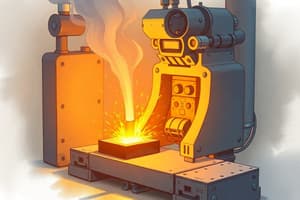Podcast
Questions and Answers
What is the first step a person must take when learning to operate machine tools?
What is the first step a person must take when learning to operate machine tools?
- Familiarize themselves with the tools' features
- Practice using the machine without supervision
- Attend a workshop on advanced machine operation
- Learn the safety regulations and safety measures (correct)
Why is it important to learn safety measures before operating machine tools?
Why is it important to learn safety measures before operating machine tools?
- To ensure efficient machine performance
- To avoid potential accidents and injuries (correct)
- To understand the economic benefits of operation
- To enhance productivity without guidance
Which of these activities is NOT recommended before operating machine tools?
Which of these activities is NOT recommended before operating machine tools?
- Reading the machine’s manual
- Using the machine without prior knowledge of safety (correct)
- Observing experienced operators
- Studying the safety regulations
What should a learner prioritize when beginning to operate machine tools?
What should a learner prioritize when beginning to operate machine tools?
What is a common misconception about learning to operate machine tools?
What is a common misconception about learning to operate machine tools?
What type of material should clothing be made of to ensure safety in a machine?
What type of material should clothing be made of to ensure safety in a machine?
Which item should be removed before starting a machine to prevent accidents?
Which item should be removed before starting a machine to prevent accidents?
What type of jewelry poses a risk when working with machines?
What type of jewelry poses a risk when working with machines?
Why should certain items be avoided when operating a machine?
Why should certain items be avoided when operating a machine?
Which of the following garments is safest to wear while operating a machine?
Which of the following garments is safest to wear while operating a machine?
What should be done with bar stock after cutting it to the desired length?
What should be done with bar stock after cutting it to the desired length?
What is the recommended method for removing chips from the work area?
What is the recommended method for removing chips from the work area?
Which of the following practices is NOT advisable when managing debris in the workshop?
Which of the following practices is NOT advisable when managing debris in the workshop?
Why is it important to promptly return bar stock to the storage rack?
Why is it important to promptly return bar stock to the storage rack?
Which action is considered a safe work practice in the workshop?
Which action is considered a safe work practice in the workshop?
What is the reason for protecting long hair while operating a machine?
What is the reason for protecting long hair while operating a machine?
What is a recommended practice when working with machinery?
What is a recommended practice when working with machinery?
Which of the following is NOT a reason to protect long hair in a workshop environment?
Which of the following is NOT a reason to protect long hair in a workshop environment?
What should be done to long hair when using machines?
What should be done to long hair when using machines?
Which of the following best describes the risk of wearing gloves while operating machinery?
Which of the following best describes the risk of wearing gloves while operating machinery?
What should a person do before operating a machine?
What should a person do before operating a machine?
What is the safest practice when making repairs to any machine?
What is the safest practice when making repairs to any machine?
How should work be positioned when using a machine?
How should work be positioned when using a machine?
What action should be taken immediately after sustaining an injury?
What action should be taken immediately after sustaining an injury?
Which of the following is NOT recommended when operating a machine?
Which of the following is NOT recommended when operating a machine?
What is the safest practice when using a welding or cutting torch regarding sparks?
What is the safest practice when using a welding or cutting torch regarding sparks?
Which of the following is a proper safety measure when operating a welding or cutting torch?
Which of the following is a proper safety measure when operating a welding or cutting torch?
What should be done with combustible materials when using a cutting torch?
What should be done with combustible materials when using a cutting torch?
What is a critical consequence of not directing sparks away from combustible materials?
What is a critical consequence of not directing sparks away from combustible materials?
Which of the following actions is NOT recommended during welding or cutting operations?
Which of the following actions is NOT recommended during welding or cutting operations?
Flashcards
Machine Tool Safety
Machine Tool Safety
Essential rules and precautions for operating machine tools safely.
Safety Regulations
Safety Regulations
Rules that govern the safe operation of machinery.
Safety Measures
Safety Measures
Actions taken to prevent accidents when using machines.
Machine Tools
Machine Tools
Signup and view all the flashcards
Tool-Specific Safety
Tool-Specific Safety
Signup and view all the flashcards
Clothing for Machines
Clothing for Machines
Signup and view all the flashcards
Remove Scarves
Remove Scarves
Signup and view all the flashcards
Jewelry Removal
Jewelry Removal
Signup and view all the flashcards
Machine Safety
Machine Safety
Signup and view all the flashcards
Prevent snags
Prevent snags
Signup and view all the flashcards
Machine safety
Machine safety
Signup and view all the flashcards
Gloves
Gloves
Signup and view all the flashcards
Hair safety
Hair safety
Signup and view all the flashcards
Hair Net
Hair Net
Signup and view all the flashcards
Revolving drills
Revolving drills
Signup and view all the flashcards
Return bar stock
Return bar stock
Signup and view all the flashcards
Remove chips
Remove chips
Signup and view all the flashcards
Safe work practices
Safe work practices
Signup and view all the flashcards
Workshop safety
Workshop safety
Signup and view all the flashcards
Cutting metal
Cutting metal
Signup and view all the flashcards
Machine Stop Procedure
Machine Stop Procedure
Signup and view all the flashcards
Power Disconnect
Power Disconnect
Signup and view all the flashcards
Secure Workpiece
Secure Workpiece
Signup and view all the flashcards
Immediate First Aid
Immediate First Aid
Signup and view all the flashcards
Machine Setup Safety
Machine Setup Safety
Signup and view all the flashcards
Welding Spark Direction
Welding Spark Direction
Signup and view all the flashcards
Combustible Material
Combustible Material
Signup and view all the flashcards
Welding Safety
Welding Safety
Signup and view all the flashcards
Torch Safety
Torch Safety
Signup and view all the flashcards
Fire Prevention
Fire Prevention
Signup and view all the flashcards
Study Notes
Production Technology - Introduction
- Course covers introductory topics in production technology
- Topics include: Introduction to Production Technology, Joining Processes and Welding, Casting and Pattern Making, Machining Processes, Material Classification and Testing, Metal Forming Processes, and Measurement and Measurement Tools.
- Evaluation includes attendance (5 marks), participation (5 marks), midterm assessment (40 marks, including workshop 15, quiz 5, written 20), final-term examination (50%) for a total of 100 marks.
Manufacturing Process
- Application of physical and chemical processes to change the geometry, properties, or appearance of a starting material to create parts or products.
- Inputs include starting material, machinery, tooling, power, and labor.
- Outputs include processed part and scrap/waste.
- Manufacturing adds value to the material by changing its shape or properties, or by combining it with other materials through processing and/or assembly operations.
Materials in Manufacturing
- Most engineering materials can be classified into four basic categories: metals, ceramics, polymers, and composites.
- These categories can combine to form metal-ceramic composites, metal-polymer composites, and ceramic-polymer composites.
Classification of Manufacturing Processes
-
Two basic types: processing operations and assembly operations
-
Processing operations alter the work material's geometry, properties, or appearance.
-
Assembly operations join two or more components to create a new product.
-
Processing operations are further categorized into:
- Shaping processes (solidification, particulate, deformation, material removal)
- Property-enhancing processes (heat treatment, cleaning and surface treatments, coating and deposition processes)
- Surface processing operations (cleaning, surface treatments, coating and thin film deposition)
-
Assembly operations include joining and mechanical assembly.
Factors to Consider in Selecting a Production Process
- Shape and size of the product
- Quantity to be produced
- Type of materials used
- Surface finish and dimensional accuracy
- Quality and property requirements
- Cost of the product
Industrial Safety
- Industrial safety is primarily a management activity
- , it is concerned with:
- Reducing hazards
- Controlling hazards
- Eliminating hazards from industries and industrial units.
- Industrial safety is important because it reduces costs associated with employee injuries, including compensation, medical aid, training new employees, lost time from work, investigation expenses, supervision and inspection costs, damage to materials, machinery, and wages payable during injuries, and loss of morale
Safety in a Workshop
-
Working safely is crucial for both workers and machines/equipment. Safe practices should be learned first in order to work correctly, efficiently, and prevent injury or damage.
-
Safety should include both personal preparation, housekeeping, safe work practices, and fire prevention.
-
Personal preparation: Wear appropriate safety gear (e.g., safety glasses, face shields, proper clothing including hair coverings) and remove harmful jewelry
-
Housekeeping: Stop machines before cleaning, keep machines/tools clean, use benches to organize tools/materials, keep the floor free of oil and grease, return materials to storage, and use brushes to clean up chips.
-
Safe work practices: Understand how to stop machines quickly, disconnect power when making repairs, securely clamp workpieces, immediately obtain first aid for injuries, remove sharp edges from workpieces, lift heavy objects safely using proper lifting techniques, know fire extinguisher location and operation, know fire exit locations, and know fire alarm box locations and operating procedures.
-
Fire prevention: Follow procedures for lighting gas furnaces, know fire extinguisher locations and operation, know fire exit locations, know fire alarm box locations and operating procedures. Be careful to direct sparks away from flammable materials when using a welding or cutting torch.
Studying That Suits You
Use AI to generate personalized quizzes and flashcards to suit your learning preferences.




